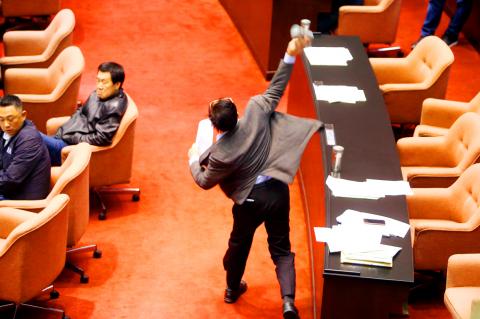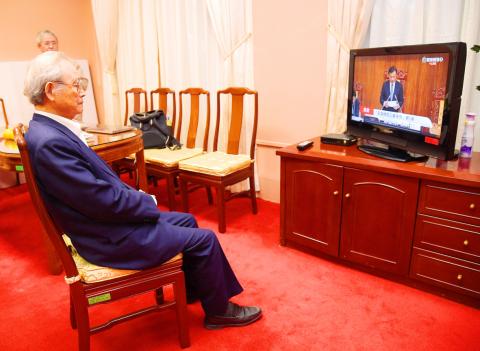The Act on Promoting Transitional Justice (促進轉型正義條例), which aims to remove authoritarian-era symbols and retry cases of injustice from that era, was passed by the Legislative Yuan yesterday evening.
The act is aimed at addressing injustices perpetrated by then-Chinese Nationalist Party (KMT) government between Aug. 15, 1945, when the Japanese government announced it had surrendered, to Nov. 6, 1992, when the Period of National Mobilization against Communist Rebellion ended in Kinmen and Lienchiang counties.
A nine-member Transitional Justice Promotion Committee is to be created, to be overseen by the Executive Yuan, with its chairman nominated by the premier and approved by at least half of the members of the Legislative Yuan.

Photo: CNA
The committee is also to address and utilize ill-gotten political party assets, but its purview will not include items already covered by the Act Governing the Handling of Ill-gotten Properties by Political Parties and Their Affiliate Organizations (政黨及其附隨組織不當取得財產處理).
The new act states that data unconstitutionally seized during the authoritarian era are to be collated and archived and made available for research and educational purposes as long as people mentioned in the data have their privacy and their freedom of communication protected.
Authoritarian symbols commemorating dictators that are publicly displayed are to be removed, renamed or addressed by other means as a way of upholding the nation’s free and democratic constitutional system.

Photo: Huang Yao-cheng, Taipei Times
Criminal cases found to have been unjustly adjudicated on are to be reinvestigated by the committee, with defendants granted retrial. People found responsible for mistrials are to be held accountable and required to compensate defendants and their family members as well as to take measures to restore their reputations.
Political parties, their affiliates and organizations they operate are to report to the committee any political files in their possession which, if necessary, are to be transferred to the government and archived.
Those that fail to do so could be fined between NT$1 million and NT$5 million (US$33,341 and US$166,705) and could be subject to repeated fines.
People found guilty of disposing of, sabotaging or concealing political data owned by political parties or their affiliated organizations could face prison sentences of up to five years.
People who object to rulings by the committee would have one month to request a reinvestigation and two months to initiate an administrative lawsuit.
Chinese Nationalist Party (KMT) lawmakers said the Democratic Progressive Party (DPP) has undermined the nation’s political system by creating an agency with administrative, judicial and investigative powers.
The passage of the act heralds the dawning of a new authoritarian era, KMT Legislator Lai Shyh-bao (賴士葆) said.
The act clearly targets the KMT and overlooks atrocities perpetrated by the Japanese colonial government, he said.
“When the KMT regains political power, we will also propose a transitional justice bill targeting [President] Tsai’s [Ing-wen, 蔡英文] authoritarian rule,” he said.
Non-Partisan Solidarity Union Legislator May Chin (高金素梅) and New Power Party Legislator Kawlo Iyun Pacidal panned the act for not requiring the government to relinquish Aboriginal lands once held by the Japanese colonial government.
However, DPP Legislator Wang Ding-yu (王定宇) said the act “opened a new frontier” for victims of the authoritarian era, as the government can now legally investigate data from that period, seek out and punish perpetrators of injustice as well as compensate the era’s victims and restore their dignity.
This story has been updated since it was first published.

Intelligence agents have recorded 510,000 instances of “controversial information” being spread online by the Chinese Communist Party (CCP) so far this year, the National Security Bureau (NSB) said in a report yesterday, as it warned of artificial intelligence (AI) being employed to generate destabilizing misinformation. The bureau submitted a written report to the Legislative Yuan in preparation for National Security Bureau Director-General Tsai Ming-yen’s (蔡明彥) appearance before the Foreign Affairs and National Defense Committee today. The CCP has been using cognitive warfare to divide Taiwanese society by commenting on controversial issues such as Taiwan Semiconductor Manufacturing Co’s (TSMC, 台積電) investments in the

HELPING HAND: The steering committee of the National Stabilization Fund is expected to hold a meeting to discuss how and when to utilize the fund to help buffer the sell-off The TAIEX plunged 2,065.87 points, or 9.7 percent, to close at 19,232.35 yesterday, the highest single-day percentage loss on record, as investors braced for US President Donald Trump’s tariffs after an extended holiday weekend. Amid the pessimistic atmosphere, 945 listed companies led by large-cap stocks — including Taiwan Semiconductor Manufacturing Co (TSMC, 台積電), Hon Hai Precision Industry Co (鴻海精密) and Largan Precision Co (大立光) — fell by the daily maximum of 10 percent at the close, Taiwan Stock Exchange data showed. The number of listed companies ending limit-down set a new record, the exchange said. The TAIEX plunged by daily maxiumu in just

‘COMPREHENSIVE PLAN’: Lin Chia-lung said that the government was ready to talk about a variety of issues, including investment in and purchases from the US The National Stabilization Fund (NSF) yesterday announced that it would step in to staunch stock market losses for the ninth time in the nation’s history. An NSF board meeting, originally scheduled for Monday next week, was moved to yesterday after stocks plummeted in the wake of US President Donald Trump’s announcement of 32 percent tariffs on Taiwan on Wednesday last week. Board members voted to support the stock market with the NT$500 billion (US$15.15 billion) fund, with injections of funds to begin as soon as today. The NSF in 2000 injected NT$120 billion to stabilize stocks, the most ever. The lowest amount it

NEGOTIATIONS: Taiwan has good relations with Washington and the outlook for the negotiations looks promising, Minister of Economic Affairs J.W. Kuo said Taiwan’s GDP growth this year is expected to decrease by 0.43 to 1.61 percentage points due to the effects of US tariffs, National Development Council (NDC) Minister Paul Liu (劉鏡清) said at a meeting of the legislature’s Economics Committee in Taipei yesterday, citing a preliminary estimate by a private research institution. Taiwan’s economy would be significantly affected by the 32 percent “reciprocal” tariffs slapped by the US, which took effect yesterday, Liu said, adding that GDP growth could fall below 3 percent and potentially even dip below 2 percent to 1.53 percent this year. The council has commissioned another institution